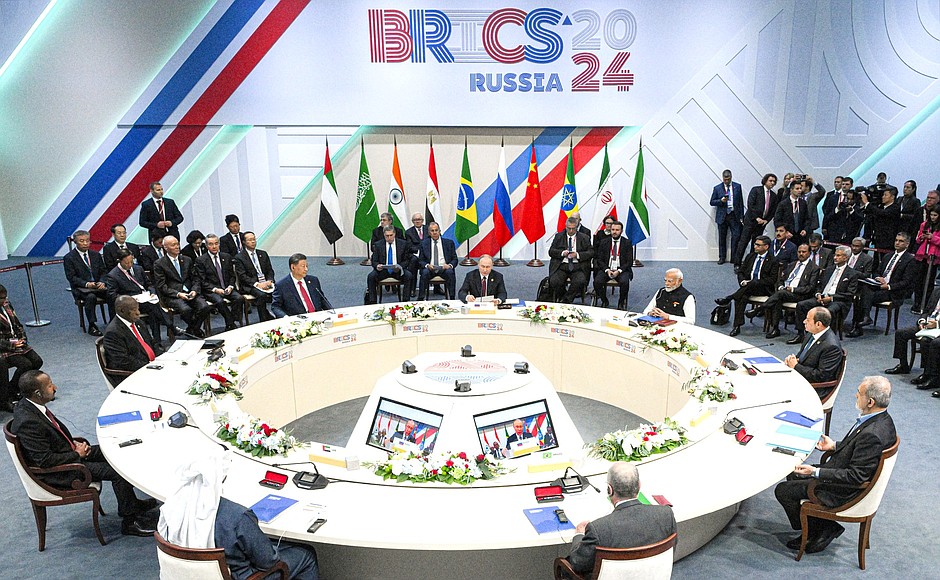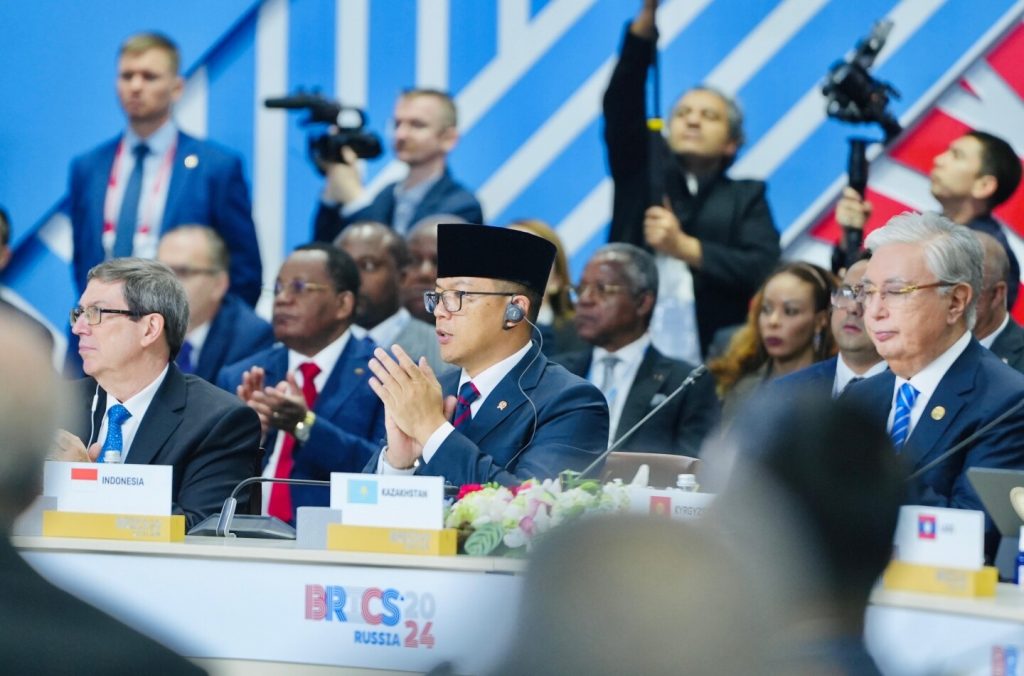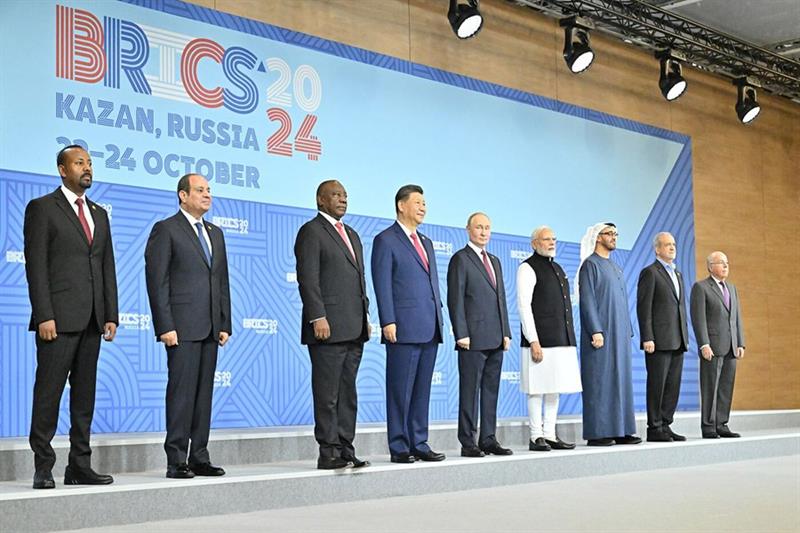In Kazan the world order has begun to transform
The BRICS summit in Kazan marked the end of the G7’s domination of the world. The Anglo-Saxon rules that organized international relations will gradually be replaced by binding commitments signed by each country. This revolution brings us back to the attempts made by Russia and France in 1899 to establish international law, thwarted by the Atlantic Conference and the United States-United Kingdom duopoly.

The XVI BRICS Enlarged Summit was held in Kazan (Russia) from 22 to 24 October. In addition to the nine heads of state and government of the countries already members of the organization, 11 other states participated; in addition, around twenty countries have submitted an application for membership.
This event represents the culmination of the strategy launched in 2019 by Brazilian President Luiz Inácio da Silva, Russian Prime Minister Vladimir Putin, Indian Prime Minister Manmohan Singh and Chinese President Hu Jintao. Their goal was to establish international relations based on the United Nations Charter, which would allow each country to develop. It was not about opposing Western imperialism of the G8 (of which Russia was a member until the 2014 Western coup in Ukraine on Maidan), but about exploring another path, without the Anglo-Saxons.
In an interview given at the Kazan summit, Putin, citing statements by Prime Minister Narendra Modi, reiterated that “BRICS is not an anti-Western organization, but a non-Western one.”
In the final declaration, the heads of state and government address four distinct issues:
– multilateralism;
– cooperation for stability and security;
– economic and financial cooperation;
– people-to-people exchanges.
Multilateralism
After acknowledging that new centers of power are emerging, independent of Western ones, the summit participants reaffirmed their loyalty to the Charter of the United Nations, in whose drafting all the BRICS member countries participated, except the United Arab Emirates, which were not yet independent at the time. They then said they were in favor of a reform of the UN and its agencies, necessary for its institutions to adapt to the contemporary world and integrate its new powers. The final declaration did not indicate a date for the reform of the Security Council and the IMF, but 2025 was set as the deadline for reforming the World Trade Organization (WTO) and the Board of Directors of the International Bank for Reconstruction and Development (IBRD).
The declaration defines as “unlawful” “unilateral coercive measures”, that is, sanctions adopted outside the Security Council, whether political or economic.
The BRICS support the work of the Intergovernmental Panel on Climate Change (IPCC) but do not comment on the conclusions drawn by Westerners. They express deep concern about attempts to link security to the climate change agenda. Further on (in paragraph 83), they condemn the use of the climate pretext to impose unilateral, punitive and discriminatory protectionist measures. They also support cooperation in the fight against greenhouse gases, in accordance with Article 6 of the Paris Agreement (§ 85).
They undertake to promote and protect human rights, including the right to development and fundamental freedoms, within the framework of the principles of equality and mutual respect. They also undertake to intensify the fight against racism, racial discrimination, and related xenophobia and intolerance, and to combat discrimination based on religion, faith or belief in whatever form it manifests itself in the contemporary world; and finally they undertake to counter the alarming trends towards an increase in hate speech.
Cooperation for stability and security
In the final declaration, BRICS agreed on a common position on the ongoing conflicts, referring to Security Council Resolution 2686 (2023), which denounces intolerant and hate speech, and to UN General Assembly Resolution 46/182 (1991) on emergency humanitarian assistance. They also reiterate the need to respect the legitimate and reasonable security concerns of all countries.

A long list of positions follows.
- Gaza (§ 30)
The urgent need is stressed for an immediate, complete and permanent ceasefire in the Gaza Strip; for the immediate and unconditional release of all hostages and prisoners on both sides who are being held illegally; for a sustained and large-scale provision of humanitarian aid; and for a cessation of all acts of aggression. The two-state solution (Lord Peel’s initial colonial plan) is supported as the only possible peaceful way out. - Lebanon (§ 31-32)
The explosion of pagers and walkie-talkies on 17 September 2024 is condemned as a “premeditated terrorist act”. The attacks against United Nations personnel and threats to their security are also condemned and the Jewish State is asked to immediately cease such actions. Strict compliance with Resolution 1701 (2006) is also called for, reiterating that it also applies to Israel, which must therefore withdraw behind the “blue line” (demarcation line). - Yemen (§ 33)
BRICS takes a stand in favor of freedom of navigation, but, instead of condemning Ansar Allah as the West does, it commits to addressing the causes of the conflict, as well as supporting dialogue and the peace process under the aegis of the United Nations. - Syria (§ 34)
The need to strictly respect the sovereignty and territorial integrity of Syria is insisted upon. The illegal foreign military presence is condemned, which increases the risk of a large-scale regional conflict. It is also stressed that illegal “unilateral sanctions” seriously exacerbate the suffering of the Syrian people. The position is also taken against the Israeli occupation of the Syrian Golan (§ 43). - Iran (§ 35 and 37)
The attack on the diplomatic headquarters of the Islamic Republic of Iran in Damascus is condemned. It is recalled that the JCPOA agreement was validated by the Security Council, for this reason the United States could not have withdrawn from it, as they did. - Ukraine (§ 36)
It is stressed that all States should act in full accordance with the purposes and principles of the United Nations Charter (implicit support for the Russian interpretation of the conflict). It is noted with satisfaction the relevant proposals for mediation and good offices of China, South Africa and India, aimed at peacefully resolving the conflict through dialogue and diplomacy. - Sudan (§ 40)
The attack by President Abdel Fattah al-Buhran’s troops on the residence of the head of the UAE embassy mission on 29 September 2024 is condemned; an attack comparable to that carried out by Israel against Iranian diplomatic missions in Syria. An immediate, permanent and unconditional ceasefire is called for. - Afghanistan (§ 42)
The principle of an independent, united and peaceful state, free from terrorism, war and drugs is upheld. The need to provide urgent and uninterrupted humanitarian aid to the Afghan people and to protect the fundamental rights of all Afghans, including women and different ethnic groups, is stressed; this includes the lifting of effective bans on access to secondary and higher education. - Disarmament (§ 43-46)
The BRICS advocate accelerating the implementation of resolutions for the establishment of a zone free of nuclear weapons and other weapons of mass destruction in the Middle East (i.e. the denuclearization of Israel), in line with the Iranian proposal.
They also advocate preventing an arms race in space, despite US opposition. - Terrorism (§ 47-49)
They reject any attempt to politicize issues of counter-terrorism and reject the use of terrorist groups to achieve political ends; they also emphasize that only the BRICS are an effective organization in this area – a direct allusion to the covert operations of the United States and the United Kingdom. They call for the rapid adoption, within the framework of the United Nations, of the Comprehensive Convention on International Terrorism. - Transnational crime (§ 50-53)
BRICS intend to address the problems of drugs, transnational crime and corruption by strengthening a coordinated repressive response.
Economic and financial cooperation
The BRICS are first and foremost addressing the need for a clearinghouse for liquidity exchange (without having to go through the SWIFT system, created by NATO’s stay-behind networks) and a reinsurance system to secure cargo transportation (without having to go through Anglo-Saxon companies or those indirectly controlled by them).
BRICS do not approach trade from the angle of free trade or tariffs, but from that of security, resilience, stability and efficiency of supply chains. For a year they have been pursuing a program to harmonize and coordinate the use of information technologies (PartNIR) in the economy and trade.
In the fight against diseases, the BRICS, while appreciating the work of the World Health Organization (WHO), are developing their own warning and assistance system.

As for intellectual property, the BRICS, aware that copyright and other patents are now the main source of income for the Anglo-Saxons (not real or financial production), intend to reorganize the system, focusing on the fight against counterfeiting rather than on increasing the revenue produced. They intend to multiply cooperation in research, development and innovation programs in the fields of biomedicine, renewable energy, space and astronomical sciences, ocean and polar sciences.
Interpersonal exchanges
The main objective of BRICS is to combat the Anglo-Saxon ideology of the clash of civilizations, relying on two United Nations agencies: UNICEF and the Alliance of Civilizations. They want to increase people-to-people exchanges in the fields of media, culture, education, sports, arts, youth, civil society, public diplomacy and university exchanges.
In this way, the BRICS are resisting a return to the past: the concept of a clash of civilizations, which was an essential part of President George Bush Jr.’s discourse, seemed to have been definitively forgotten. It has come back into fashion with the candidacy of Kamala Harris, supported by neoconservatives. It is nothing more and nothing less than a hypocritically educated reformulation of the old violent discourses of the years 1930-1945: in order to survive, Westerners have no choice but to eliminate others.
Summit Remarks
It was held at a time when the world is witnessing Israeli ethnic cleansing firsthand: first in Gaza, then also in southern Lebanon. At the same time, the Russian special military operation to implement Security Council Resolution 2202 (Minsk Agreements) in Ukraine is turning to Moscow’s advantage. The Ukrainian army will not survive the winter, and unilateral Western coercive measures have all failed.
Participation in BRICS therefore appears as a revolt against the Anglo-Saxon World Order. One can only be disappointed by the step back of Brazilian President Luiz Inácio Lula da Silva, who did not dare to personally attend the Kazan summit and was represented by Foreign Minister Mauro Vieira.
Brazil is a founding member of BRICS. It is true that Brazil is involved, as it holds the presidency of the New Development Bank, in the guise of former President Dilma Youssef, overthrown in an operation orchestrated by the United States and Israel.
The same observation applies to the last-minute refusal of Prince Mohammad Ben Salman of Saudi Arabia to side with one of the two camps and go to Kazan, even though his privileged ally, the United Arab Emirates, is now a member of BRICS, represented in Kazan by President Sheikh Mohammed ben Zayed Al Nahyane.
Russia chose to host the summit in Kazan, the capital of Tatarstan, because this dynamic city illustrates both the integration of Muslims into the Russian Federation and Moscow’s ability to delegate powers.
On the economic front, the summit made progress in de-dollarizing international trade. BRICS are moving towards a digital currency. There was also talk of a common tax authority, a court to arbitrate economic disputes between member countries. The idea of a grain exchange also emerged, as well as the possibility of creating an independent settlement and cross-border deposit infrastructure, BRICS Clear. Finally, BRICS are making progress in developing a payment card system, called BRICS Pay and presented during the summit. Its operation seems relatively classic: the BRICS Pay card should allow payments to be settled in national currency through the use of a QR code, charging an electronic wallet, powered by an application of the same name and linking a Visa, MasterCard or Mir bank card to it. The problem is how to maintain complete sovereignty while participating in a collective currency.
In political terms, the summit demonstrated above all that the BRICS reject the changing rules of the West, established by the G7 on a clientelistic basis, preferring to respect the given word, that is, international law. The countries of the Global South (in contrast to the Collective West) are deeply aware of the commitments and treaties, first signed and then shamelessly violated by the Anglo-Saxons. Westerners believe that, in the name of democracy, an elected head of state or government may not feel bound by the signatures of those who preceded him; on the other hand, the other states, considered by them to be illiberal or dictatorial, believe that the signature needs to be honored anyway. For example, Joe Biden did not consider himself committed to the two documents signed by his friend Barack Obama: the Istanbul Agreement (1999) and Resolution 2202 (2015) on the Minsk Agreements. Biden therefore claims that Russia has invaded Ukraine and is violating the United Nations Charter, while numerous subsequent texts demonstrate that Russia had followed its principles to the letter.
The IMF has just revised its calculation methods and placed Russia’s GDP, in purchasing power parity, in fourth place, behind China, the United States and India. Moscow has thus jumped 23%, up from the depressing 48th place it previously occupied. However, beyond the economic realities (the BRICS represent 37% of global GDP and 45% of the world’s population, while the G7 represents 29% of GDP and 10% of the population), this summit has been an eye-opener for many. The world order is starting to transform. It is no longer dominated by Washington and London.
Author: Thierry Meyssan
yogaesoteric
November 1, 2024
